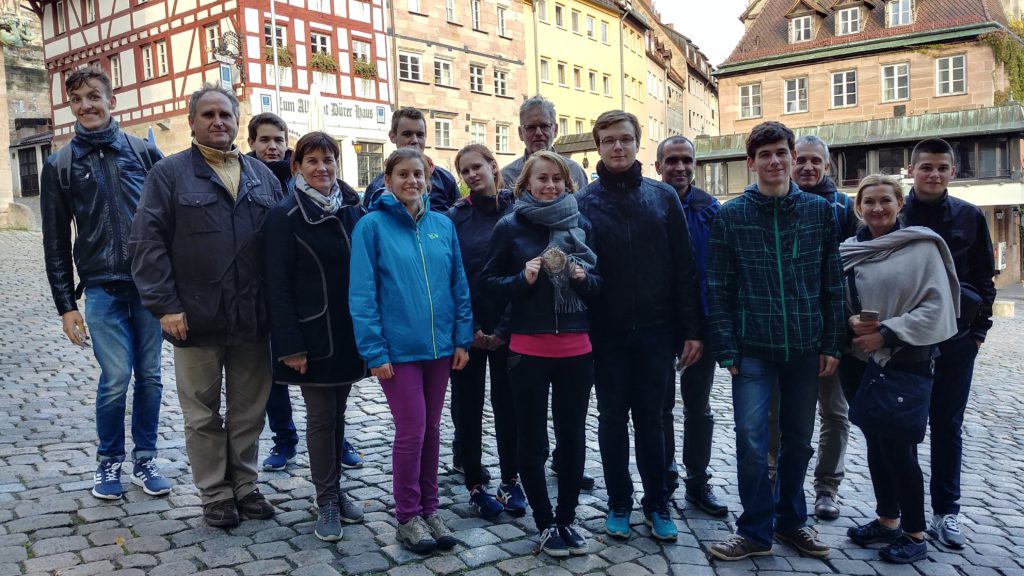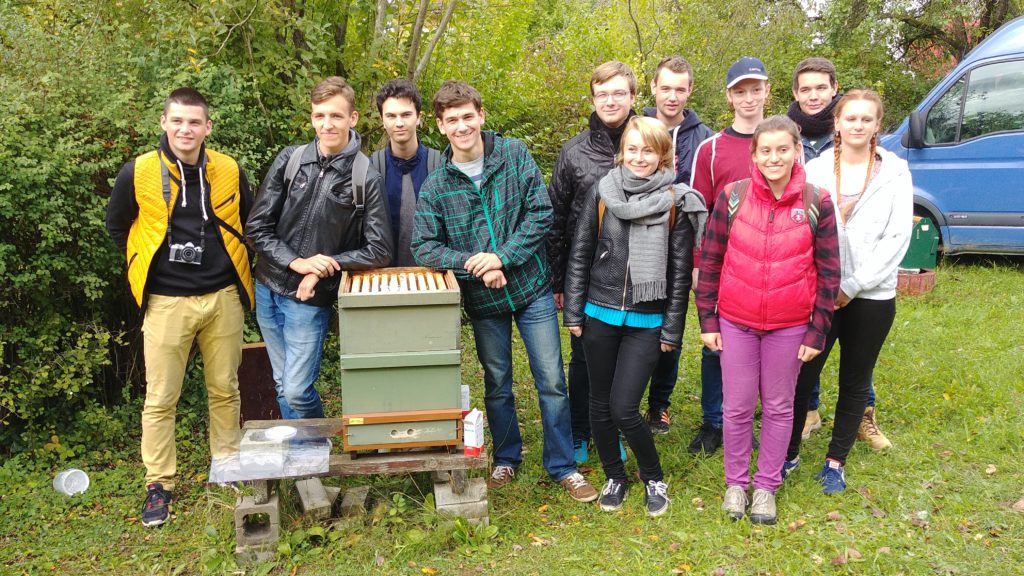International Young beekeepers meeting in Nuremberg
As a last meeting of the 2-year programme “Rojeni – Swarming”, which was financially supported by the EU-programme “Erasmus+” and led by Jiri Cafourek from Vceli straz (BeeGuard) in cooperation with 8 countries, 11 young beekeepers met together with their adult companions from 14th to 17th of September 2017 in Nuremberg. In Nuremberg, famous for its beekeeping tradition, they visited several institutions and beekeeping initiatives to widen their horizon and bring home new, inspiring ideas for their own beekeeping development.
 On the first day we explored the medieval city of Nuremberg. It has been a trading city, situated along important trading routes e.g. for spices. With its large castle, it was one of the official seats of the Emperors of the Holy Roman Empire. In its darkest historical moment, as the center of the Nazi movement, Nuremberg had almost been completely destroyed and then rebuilt at the end of World War II.
On the first day we explored the medieval city of Nuremberg. It has been a trading city, situated along important trading routes e.g. for spices. With its large castle, it was one of the official seats of the Emperors of the Holy Roman Empire. In its darkest historical moment, as the center of the Nazi movement, Nuremberg had almost been completely destroyed and then rebuilt at the end of World War II.
On the next day, we visited the „Landesanstalt für Wein und Gartenbau“ in Veitshöchheim (near Würzburg), a state institute to support beekeepers in northern Bavaria. Their current research is focused on the control and treatment against the varroa mite. In addition, it established a monitoring system across Bavaria on two new invasive species: the Small Hive Beetle (Aethina tumida) whose larvae feed inside the beehive and the Asian hornet (Vespa velutina) which almost exclusively feeds on foraging bees. In the practical part of our visit, we got informed about a method to detect the amount of varroa in a beehive with the help of powdered sugar and how bee colonies can be treated against varroa with organic acids (lactic acid, formic acid, oxalic acid) instead of applying synthetic remedies. For further information please see: www.lwg.bayern.de. In the afternoon, we visited a local beekeeper family who has around 100 bee colonies. It was interesting to see and exchange how every beekeeper has found its own way of beehive management and product marketing (see www.bienenhof-keil.de).
T he next day we saw a presentation of the beegroup of the University of Würzburg on their HOBOS-project (HOney Bee Online Studies). Bee colonies in different locations of Germany are monitored with a huge number of parameters (e.g. hive temperature, humidity, weight) together with outside climate parameters and equipped with a light barrier to detect leaving and incoming bees. Moreover, cameras are installed inside the beehive to see live inside the beehives without disturbing the colony. It was interesting to see how bee-science looks like. And it can be useful for our young beekeeping groups since all data are available via the Internet and can be used to answer own scientific questions in analyzing and combining the relevant data (see www.hobos.de, also available in English).
he next day we saw a presentation of the beegroup of the University of Würzburg on their HOBOS-project (HOney Bee Online Studies). Bee colonies in different locations of Germany are monitored with a huge number of parameters (e.g. hive temperature, humidity, weight) together with outside climate parameters and equipped with a light barrier to detect leaving and incoming bees. Moreover, cameras are installed inside the beehive to see live inside the beehives without disturbing the colony. It was interesting to see how bee-science looks like. And it can be useful for our young beekeeping groups since all data are available via the Internet and can be used to answer own scientific questions in analyzing and combining the relevant data (see www.hobos.de, also available in English).
Disabled people and beekeeping? Does this match? The “norisinklusion”, a city owned company in Nuremberg, keeps own beehives which are managed by disabled people, though in some aspects it still requires the assistance of an experienced beekeeper. In addition norisinklusion offers various services to other local beekeepers like extraction of honey, filling up honey into the glasses, labelling them or the production of wax plates. For norisinklusion it is important that by offering the beekeeping services to the public, disabled people participate in the social life instead of being separated. In addition, working with bees has already shown positive aspects on people with depressions or on people with limited self-confidence (see www.norisinklusion.de/flottebiene).
Finally, we got informed about the beekeeping history around Nuremberg in the “Zeidlermuseum” in Feucht. The vast forests with its high flower diversity surrounding Nuremberg were the basis of a long tradition of beekeeping. In these times, bees were kept in natural tree holes that were managed by the “Zeidler”, which means “the person cutting honey” indicating that complete honey combs were cut out of the log. The wax has been used to produce candles, especially for churches. The honey has been used for example to produce the world famous “Nürnberger Lebkuchen”, gingerbread coming from Nuremberg. Since the beekeepers were of great economic importance, they received several privileges by the emperor Charles IV., for example to judge over people that violated the laws in the forest. In addition, they were allowed to wear weapons like a crossbow to fight against wild animals like a bear (see www.zeidelmuseum.de).
We had a wonderful time here in Nuremberg. We discussed and exchanged our beekeeping experiences and enjoyed the friendship of beekeepers across all the participated nations.
Jens Heber
Main organiser of meeting in Nuremberg
All photos can be found on the following website.
